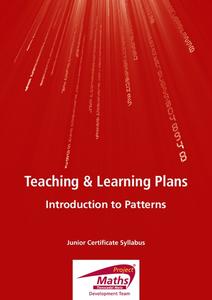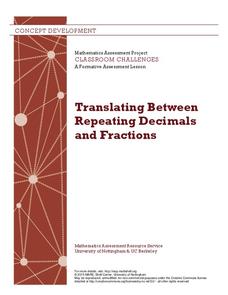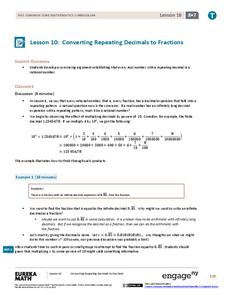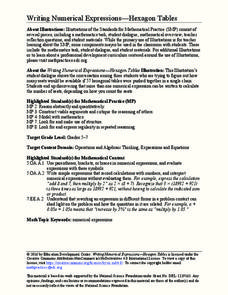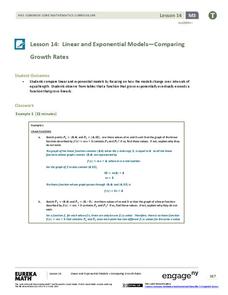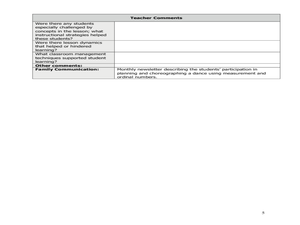5280 Math
Decimal Patterns
Find patterns in the process instead of the result. Learners convert series of decimals and fractions identifying patterns along the way. The lesson includes nine problem tasks with progressively more involved patterns.
Project Maths
Introduction to Patterns
The world is full of patterns. Help learners quantify those patterns with mathematical representations. The first Algebra lesson in a compilation of four uses a series of activities to build the concept of patterns using multiple...
Mathematics Assessment Project
Translating Between Repeating Decimals and Fractions
Model for your young mathematicians the process for converting repeating decimals to fractions. To demonstrate their understanding of the process, class members then complete and assessment task and participate in an activity matching...
PBS
Patterns to the Rescue!
Track down the Cyberchase episode that this lesson plan is associated with. Using a worksheet that is embedded in the plan, learners must find the next two numbers and shapes (a double pattern). Once these have been discovered, pupils...
Mathematics Assessment Project
Generalizing Patterns: Table Tiles
As part of a study of geometric patterns, scholars complete an assessment task determining the number of tiles needed to cover a tabletop. They then evaluate provided sample responses to see different ways to solve the same...
Mathematics Assessment Project
Generalizing Patterns: The Difference of Two Squares
After completing an assessment task where they express numbers as the difference of squares (i.e., 9 = 5^2 – 4^2), class members note any patterns that they see in the problems.
EngageNY
Converting Repeating Decimals to Fractions
Develop a process with your classes for converting repeating decimals to fractions. Through this process, pupils understand that any repeating decimal can be written as a fraction. The 10th activity in this 25-part module helps...
Curated OER
Patterns
Fourth graders investigate patterns and sequences. For this patterns and sequences lesson, 4th graders use a hundreds chart to build recurring patterns. Students skip count by threes and fives on a hundreds chart by coloring...
Curated OER
Investigation-How Many Toothpicks?
Seventh graders use toothpicks to investigate a series of designs and identify patterns. Data is organized and analyzed using tables and graphs, and students make generalizations using algebraic expressions.
Illustrative Mathematics
Complex number patterns
Start off with the definition of the imaginary number i, then have your class practice simplifying expressions involving powers of i and look for patterns. See how the cyclic nature of powers of i translate to sums of powers of i.
EngageNY
Numbers in Exponential Form Raised to a Power
Develop an understanding of the properties of exponents through this series of activities. This third lesson of 15 explores the patterns associated with the power property. Scholars expand the powers before applying the property.
Curated OER
Repeating Patterns
Students explore growth patterns by using manipulatives such as pattern blocks, investigate growth pattern of pattern, record growth in T-chart, describe how pattern is growing, and predict number of blocks needed to extend pattern.
Education Development Center
Writing Numerical Expressions—Hexagon Tables
Explore a basic pattern to practice writing expressions. In collaborative groups, learners examine a contextual pattern and write an expression to model it. The task encourages groups to describe the pattern in multiple ways.
EngageNY
Algebraic Expressions—The Distributive Property
Do your classes truly understand the distributive property? Use a demonstrative lesson to represent the distributive property in various ways. Learners solidify understanding by creating a geometric pattern for distributive...
Curated OER
Weaving a Story
It's time to investigate patterns! First and second graders construct a paper weaving using a hundreds chart, then use the Ti-10 calculator to make patterns such as adding 3 each time. Learners remove multiples of three from the hundreds...
Curated OER
Pattern Play
Students create their own number patterns to reinforce their understanding of the concept of patterns. They also search for the unexpected guests in each other's patterns.
Illustrative Mathematics
Kitchen Floor Tiles
An interesting way to look at the kitchen floor is to count the number of tiles in the border. Fred starts with four white floor tiles and writes an expression for the number of tiles needed for the colored border. Algebra learners are...
EngageNY
Linear and Exponential Models—Comparing Growth Rates
Does a linear or exponential model fit the data better? Guide your class through an exploration to answer this question. Pupils create an exponential and linear model for a data set and draw conclusions, based on predictions and the...
Curated OER
Investigation - Square Numbers and Triangle Numbers
Fifth graders investigate growth patterns using blocks. In this square and triangle numbers lesson, 5th graders predict sizes of larger triangles and squares based on numerical patterns they observed while building.
Curated OER
Recognize, create and Record Simple Repeating Patterns
Students analyze, create, and record repeating patterns. In this geometry lesson, students create shapes using patterns and keep track of the different shapes. They incorporate transformation and reflections into their patterns.
Curated OER
Tessellations
Students create tessellations. In this geometry lesson, students use polygons to create different patterns by rotation. They identify the reasons for polygons to create the type of tessellation it does.
Curated OER
Dance and Math
Second graders examine human body movements by measuring the choreography of a dance. In this physical education lesson, 2nd graders participate in a creative dance which is based on specific movements of each limb, which students...
Curated OER
Symmetry with Manipulatives
First graders investigate symmetry in patterns by utilizing unifix cubes. In this pattern lesson, 1st graders practice creating patterns that are perfectly symmetrical no matter which way it's looked at. Students utilize...
Curated OER
Seeing Double
Students develop an intuitive definition for symmetry after viewing a PBS video. They examine asymmetrical patterns and demonstrate their knowledge by changing them to symmytrical.

